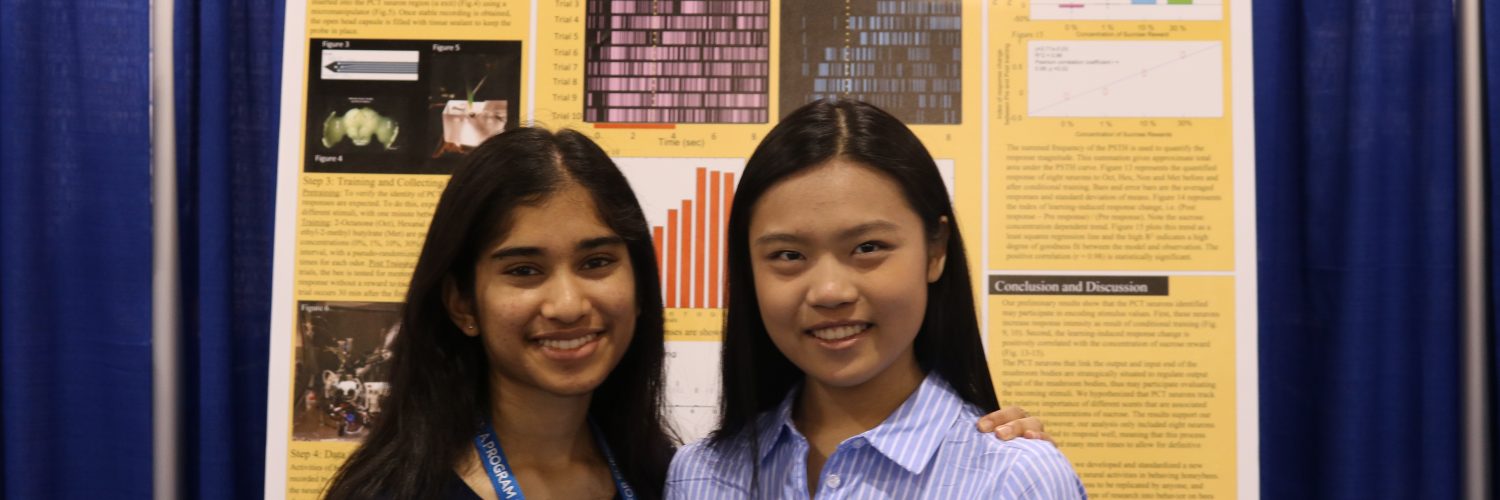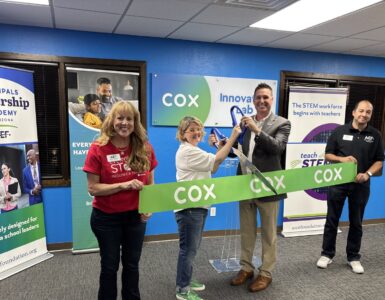More than 1,800 young scientists gathered at the Phoenix Convention Center to participate in the world’s largest international pre-college science competition, the Intel International Science and Engineering Fair (Intel ISEF).
Intel ISEF, a program of the Society for Science & the Public (SSP), gives students around the world a chance to explore their passion for developing innovations that improve society.
“The Intel International Science and Engineering Fair is the world’s most powerful STEM talent pipeline and I am inspired by all of the ingenuity on display this week,” Maya Ajmera, president and CEO of the Society for Science & the Public and publisher of Science News, said. “Congratulations to our winners and all our finalists who are demonstrating that world-changing ideas can come from anywhere in the world.”
Overall Winners
Krithik Ramesh, a 16-year-old from Greenwood Village, Colorado, was awarded the first-place prize for developing a machine learning technology for orthopedic surgeons.
Ramesh received the $75,000 Gordon E. Moore Award, named in honor of the Intel co-founder and fellow scientist, for his project that uses machine learning and computer vision to help orthopedic surgeons achieve greater accuracy for screw placements during spinal surgery.
“Based on Ramesh’s tests, this method has the potential to decrease operating time by at least 30 minutes, reduce physical therapy recovery time by four weeks and diminish the negative side effects associated with traditional medical imaging,” Intel said in a statement.
Allison Ja, a 17-year-old from San Jose, California, and Rachel Seevers, a 17-year-old from Lexington, Kentucky, received the two Intel Foundation Scientists Awards of $50,000.
Ja investigated toxic tau protein aggregates, which spread in neurons in the human brain and are associated with neurodegenerative diseases such as Alzheimer’s. Seevers designed, built and tested a rigid, energy-efficient prototype of an underwater propulsion device that mimics the way jellyfish move through the water, allowing for greater access to the world’s unexplored oceans.
“Intel is proud to honor Krithik Ramesh, Rachel Seevers, Allison Jia, Shriya Reddy and all of the ISEF finalists on their innovative work, which is helping to advance key research areas and provide solutions to global challenges that are critical today. The work they are doing has the potential to make a better tomorrow for all of us,” said Pia Wilson-Body, president of the Intel Foundation. “And I would be remiss if I didn’t highlight the communities of support surrounding these students every day: parents, teachers, mentors, administrators, supporters and organizations like SSP who provide opportunities for students to engage and explore the world of STEM, and ultimately reach their full potential.”
Best of Category winners
On top of the three winners, there were 22 “Best of Category” winners, who each will receive a $5,000 prize in addition to their $3,000 first-place award. The Intel Foundation will also award a $1,000 grant to each winner’s school and the affiliated fair they represent.
The category winners are:
- Animal Sciences: Dylan Bagnall and Richard Beattie, Dublin, Ireland
- Behavioral and Social Sciences: Giovanni Santucci, Ossining, New York
- Biochemistry: Annika Morgan, Redding, Connecticut
- Biomedical and Health Sciences: Shriya Reddy, Northville, Michigan
- Biomedical Engineering: Krithik Ramesh, Greenwood Village, Colorado
- Cellular and Molecular Biology: Allison Jia, San Jose, California
- Chemistry: Helena Jiang, Gainesville, Florida
- Computational Biology and Bioinformatics: Jason Ping, Hackensack, New Jersey
- Earth and Environmental Sciences: Katie Lu, Springfield, Missouri
- Embedded Systems: Max von Wolff, Mayen, Germany
- Energy: Chemical: Shicheng Hu, Shanghai, China
- Energy: Physical: Joonyoung Lee and Mincheol Park, Busan, South Korea
- Engineering Mechanics: Rachel Seevers, Lexington, Kentucky
- Environmental Engineering: Adyant Shankar, Nashua, New Hampshire
- Materials Science: Adrien Jathe, Frankfurt, Germany
- Mathematics: AnaMaria Perez, Albuquerque, New Mexico
- Microbiology: Poojan Pandya and Leo Takemaru, Dix Hills and East Setauket, New York
- Physics and Astronomy: Kaylie Hausknecht, Lynbrook, New York
- Plant Sciences: Amara Ifeji, Bangor, Maine
- Robotics and Intelligent Machines: Kevin Meng, Plano, Texas
- Systems Software: Adam Kelly, Dublin, Ireland
- Translational Medical Science: Hannah Herbst, Boca Raton, Florida
Arizona finalists:
34 Arizona students participated in the Intel ISEF. Of those, 19 walked away with awards, prizes and scholarships valued at more than half a million dollars.
- Thalia Liu, Abby Liu and Ella Ai, Hamilton High School: Identifying Key Pathways/Mechanisms for the Generation of Pancreatic Beta Cells by Trans-differentiation of Acinar Cells, Fourth Award in Biomedical and Health Sciences, $500 each;
- Mindy Long, Hamilton High School: A Smartphone-Based, Point-of-Care Iron Sensor Utilizing Colorimetric Techniques, Fourth Award in Biomedical Engineering, $500;
- Nisha Kulkarni, BASIS Chandler/ Angela Dina, Corona del Sol High School: The Neural Mechanism Underlying Stimulus Evaluation of the Honeybee Brain, Third Award in Animal Sciences, $1,000 each;
- Annalisa Minke, Immaculate Heart High School: Investigating How Water Vapor Emission Impacts the Temperature of the Troposphere, National Oceanic and Atmospheric Administration (NOAA) award of $1,500 and University of Arizona’s Renewal Tuition Scholarship of $40,000;
- Ethan Rosenfeld, Phoenix Country Day School: Development of a Thin and Inexpensive Open-Air Proton Beam Detector for Characterizing the Beam Profile and Position, Fourth Award in Physics and Astronomy, $500;
- Kasyap Chakravadhanula, BASIS Scottsdale: Retina: A Non-Invasive, Predictive Smartphone Application to Test for Cardiovascular Risk and Diabetic Retinopathy via Analysis of Cardiovascular Risk Factors and Retinal Fundus Images, Fourth Award in Computational Biology and Bioinformatics, $500;
- Nikhil Suresh and Saaketh Narayan, BASIS Scottsdale: HemaDrop: A Novel Elemental Composition Technology for Microliter-Size Blood Droplets via Solid State Techniques, Fourth Award in Material Science, $500;
- Thor Gavin, Academy of Excellence: Asguardian Cyber: A Customized Cybersecurity Program to Prevent Intrusions from Hackers, UA Renewal Tuition Scholarship, $40,000;
- Damian Galasso, Galasso Homeschool: Growth Promotion and Yield Enhancement of Crop Seeds with Plant Products: Effects of Extracts, Endophytic Symbionts, and Endosperm, Third Award in Plant Sciences, $1,000, and UA Renewal Tuition Scholarship, $40,000;
- Vishakk Rajendran, Jeremy Wang and Meena Ravishankar, BASIS Tucson North: A Comparison of the Biofilm Forming Potential of Native Microbiota of Various Leafy Greens on Different Food Contact Surfaces, UA Renewal Tuition Scholarship, $40,000 each;
- Matthew Fosdick, Empire High School: A Novel Approach to Renewable Energy: Light Stimulated Active Cation Transport Membrane via Covalent Modification with a Photoacid, Arizona Public Service Company (APS) Second Award, $2,000; UA Renewal Tuition Scholarship, $40,000; and Arizona State University Intel ISEF Scholarship, $180,000;
- Max Michaud, University High School: Chance of Non-Nucleated Light Source Superposition on Ultra-Diffuse Galaxy Centers, UA Renewal Tuition Scholarship, $40,000;
- Rose Long, University High School: Effects of an Instructor’s Ideology on a Student’s Perspective, UA Renewal Tuition Scholarship, $40,000.
“My favorite part in doing this is explaining to people and connecting with people to give them this project and tell them that yes, education is important because most people like learning here,” said Rose Long who received $40,000 from the University of Arizona for her study on how a teacher’s beliefs and ideology affect a student’s perspective. “When presenting it to judges and teachers and everybody like that they said ‘yes, this does happen, I do remember back in school, it’s my teacher’s fault for everything now that I believe in.’ So I just had a lot of fun with explaining it to people.”
Thor Gavin, a high schooler from Sierra Vista, received the same award for his work towards protecting small businesses from hackers.
“I realized there was a big need in small businesses because they really don’t have a lot of support and a lot of them don’t even know what’s happening until it hits them,” Gavin said. “The only option for small business that’s viable is Security Software, [which] is really good for web protection… but what they don’t have is the configuration and actual settings in the machine. What I did to fill this gap was I created a series of programs that automatically configures the basic security settings and it allows others to be customized based on the needs of the person who’s using it.”
Intel ISEF 2019 finalists were chosen from more than 400 affiliated fairs from around the world, both individuals and team projects that “tackle challenging scientific questions that address some of today’s most pressing global issues” can be selected.
















Add comment